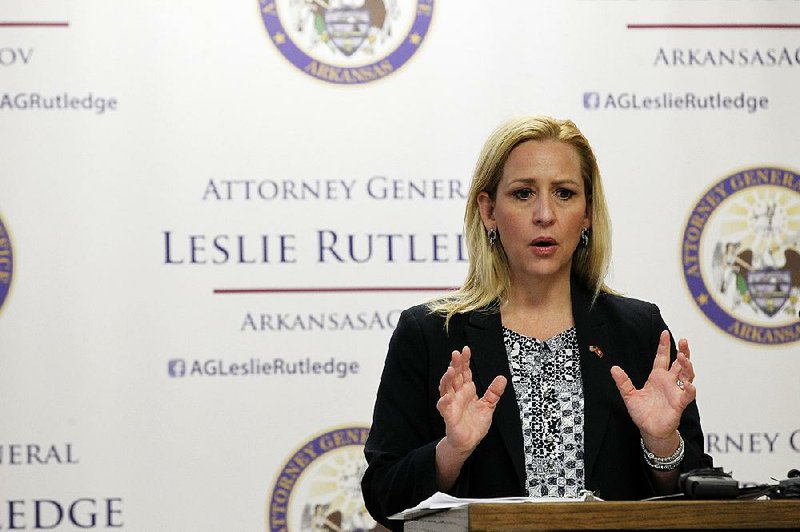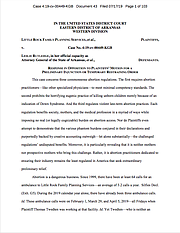Three new Arkansas abortion laws are "commonsense," impose no burdens on women's access to abortion and should not be blocked by a judge, attorneys for the state argued Wednesday.
A federal court filing signed by state Attorney General Leslie Rutledge opposes arguments made by Arkansas abortion clinics, which asked a federal judge in June to stop the new laws from going into effect.
The laws in question, all of which were passed during this year's legislative session and are set to go into effect next Wednesday, are:
• Act 493, which prohibits abortion after 18 weeks of pregnancy, with exceptions for medical emergencies and for cases of rape or incest.
• Act 619, which prohibits abortions at any stage of pregnancy based solely on the prenatal diagnosis of Down Syndrome.
• Act 700, which requires abortion providers to be board-certified or eligible for board certification in the obstetrics-gynecology specialty and changes the definition of viability to include the likelihood of fetal survival, with or without artificial life support.
Wednesday's 103-page filing says the new laws benefit "society, mothers and the medical profession in a myriad of ways" without limiting access to the procedure.
The state's attorneys framed the laws as protective of women and fetuses with Down syndrome, arguing that the public interest favors "protecting patient health and safety from ill-trained abortion practitioners and risky abortion practices, safeguarding medical ethics, and preventing eugenics."
The filing was submitted in response to a lawsuit filed in June, in which the state's abortion providers and doctors sued state officials in an effort to block the new laws.
Little Rock Family Planning Services (a provider of medical and surgical abortions in Little Rock), Planned Parenthood regional affiliate Planned Parenthood Great Plains, and two doctors were named as plaintiffs in the lawsuit, which was backed by the American Civil Liberties Union of Arkansas.
The plaintiffs requested a temporary restraining order and a permanent injunction that would prevent the laws from being enforced. They argued that the new rules threaten providers' existence and imperil Arkansans' constitutional right to abortion.
The three new laws, attorneys for the plaintiffs wrote, "will require Plaintiffs to turn away women seeking abortion care."
"As a result, some women will be forced to delay their access to abortion (increasing risk to their health and wellbeing); others will have to travel hundreds of miles to obtain care (and incur all the associated economic and logistical burdens); others will attempt to seek abortions outside the medical system; and still others will be prevented from obtaining abortion care entirely, forced to carry their pregnancies to term against their will," their complaint said.
Named as defendants were Rutledge, Pulaski County Prosecuting Attorney Larry Jegley, Washington County Prosecuting Attorney Matt Durrett, Arkansas Health Department Director Dr. Nathaniel Smith, Arkansas State Medical Board Chairman Dr. Sylvia Simon and the board's members.
In Wednesday's filing, Rutledge and other attorneys argued that Arkansas is entitled to make rules addressing potential injury to women, including the rule about board certification, which they said was upheld by another court regarding a similar law in Mississippi.
They wrote that the new rules weren't shown to meaningfully inhibit abortion access even if some Arkansas clinics were to close, citing the existence of abortion services in Memphis; Jackson, Miss.; Tulsa; and other cities.
"Nor do Plaintiffs even attempt to demonstrate that the various phantom burdens conjured in their declarations and purportedly backed by creative accounting outweigh -- let alone substantially -- the challenged regulations' undisputed benefits," the state's attorneys wrote.
In a phone interview Wednesday, ACLU of Arkansas legal director Holly Dickson said the plaintiffs' attorneys would respond in court after fully reviewing the state's response.
She said there was "absolutely nothing there that changes our position," and she called the state's arguments that new laws would protect women "disingenuous."
For example, she said, abortion training is not a requirement to become board-certified in obstetrics and gynecology.
"It's really restricting women's access to physicians who live near them, who know them, and who know this area of medical practice. ... The goal is to make it so they don't have access to care," Dickson said.
Bettina Brownstein, another attorney for the plaintiffs, said the new laws had "nothing to do" with women's safety.
"For god's sake, women don't need protection by the state of Arkansas," she said. "Women can make decisions on their own. They don't need politicians telling them what they can and can't do with their own bodies."
She said she hoped for a ruling in the case before the laws' scheduled effective date next week.
A hearing in the case is set for Monday before U.S. District Judge Kristine Baker, who took over for a different judge when two cases were consolidated earlier this month.
Arkansas is among many states that recently have passed laws that in some way affect access to abortion, many of which are expected to be challenged in court.
Nine such bills were passed by the Arkansas Legislature this year alone, according to previous reports.
In surrounding states, new laws have included bans on abortion after six weeks of pregnancy in Louisiana and after eight weeks in Missouri, both of which were signed into law this spring.
Proponents and opponents of abortion rights both have said they expect newly passed restrictions to appear before the Supreme Court, potentially challenging Roe v. Wade, the 1973 case that guaranteed the right to abortion.
Rutledge said in a statement Wednesday that she was proud "to defend Arkansas law, particularly when defending Arkansas' commitment to protect the sanctity of life for mothers and their unborn children."
Information for this article was contributed by Linda Satter of the Arkansas Democrat-Gazette.
A Section on 07/18/2019
CORRECTION: Act 619 of 2019 prohibits abortions at any stage of pregnancy based solely on the prenatal diagnosis of Down Syndrome. An earlier version of this article incorrectly described the stage of pregnancy covered by the law.

